- Home
- Rosamunde Pilcher
Flowers in the Rain & Other Stories Page 3
Flowers in the Rain & Other Stories Read online
Page 3
* * *
Northumberland. Kinton. Aunt Mabel’s party. Who would be there? Tom was the sole representative of his particular family, but what about all the other cousins? All Ned’s young relations, who had formed the larger part of that gang of children who had run wild at Kinton when they were young. He ran a mental finger down an imaginary list. Roger was a soldier. Anne married and with a family. Young Ned was in Australia. Kitty …
Putting on speed to pull out into the fast lane and pass a thundering lorry, Tom found himself smiling. Kitty. By some confusion of generations, Kitty was Ned’s great-niece. Kitty had been the rebel, the one who led the way. Kitty who fell out of the tree-house. Kitty who organized the skating party the night the lake was frozen. Kitty who slept out on the battlements because one of the others had dared her, and because she thought that she might see a ghost.
The rest of them, over the years, had, more or less, conformed. Taken typing courses and become secretaries. Been articled to chartered accountants or lawyers and finally qualified. Joined the services. Kitty had conformed to nothing. In desperation her parents had sent her to a French family in Paris as an au-pair girl, but after Madame had found her in the passionate embrace of Monsieur, she was given—unfairly, everybody agreed—the sack.
“Come home,” her frantic mother had cabled her, but Kitty hadn’t. She had hitched a lift to the south of France, where she met up with a most unsuitable—everybody agreed again—man.
He was called Terence, a wild Irishman from County Cork, and he ran a yacht-charter service out of Saint-Tropez. For a bit Kitty chartered yachts with him, and then brought him back to England to meet her parents. The opposition to him had been so deadly and so absolute that the inevitable happened and Kitty married him.
“But why?” Tom asked his mother when he heard this incredible news. “He’s a gruesome chap. He’ll make a rotten husband. Why did she marry him?”
“I’ve no idea,” said his mother. “You know Kitty better than I do.”
“She was the sort of person,” Tom told her, “that you could lead with a carrot, but you could never push with a goad.”
“What a pity her parents never found that out,” said his mother.
Once, on the way back to London after a weekend in Sussex, he had gone to see Kitty and her husband; they had a boat on the Hamble River and Kitty was pregnant. The boat, and Kitty, were both in such a state of shambles, that Tom, without having meant to, asked Kitty and her husband out for dinner. It was a disastrous evening. Terence had got drunk; Kitty had talked nonstop, as though she had been wound up; and Tom had said scarcely anything at all. He had simply listened, paid the bill, helped Kitty get Terence back on board, and flat on his back on his bunk. Then he had left her, got into his car, and driven back to London. Later he heard that the baby was a boy. He did not see her again. He did not see either of them. Mainly he did not want to become involved.
Once, when he was a young man, Mabel told Tom that he should marry Kitty. He had bucked from the very idea, partly because she was like a sister to him, and partly because he was embarrassed, at nineteen, even to be talking about such things as lasting love and matrimony.
“Why do you say that?” he had asked Mabel, nonplussed as to why she had boxed him into this uncomfortable corner.
“You’re the only person she’s ever taken any notice of. If you told her to do something, or not to do it, then she’d behave herself. Of course those parents of hers have never known how to deal with her. There’s a lot going for Kitty, if only they’d let her do her own thing.”
“She’s so bouncy, she’d wear me out,” Tom had said. He was just going to Cambridge and bouncy sixteen-year-olds had no place in his plans. He was into the older woman, the skinnier and sexier, the better.
“She won’t always be bouncy,” Aunt Mabel pointed out. “One day she’ll be beautiful.”
“I’ll wait for that.”
* * *
The road unrolled like a great grey ribbon behind him. He was through Newcastle and now deep into Northumberland. He left the Motorway and headed into the country, through hilly moorland and small stone villages, and down steep avenues of beech. By now it was late afternoon. The sun was setting in a blaze of pink, casting rosy shadows on the undersides of large, wet-looking clouds, and tinting the blue bits of sky that showed between them to an extraordinary, translucent aquamarine.
He came at last to Kinton, rounded the squat, square-towered church, and the main street of the village stretched before him. It was an unremarkable street. Two rows of small houses, little shops, a pub. It could have been anywhere. Except that, at the far end of this street, a cobbled ramp climbed a grassy slope and passed beneath the arch of a magnificent gatehouse. Beyond the gatehouse was a high-walled courtyard as big as a rugger pitch, and on the far side of this stood the castle. Four stories high, square and turreted with the pepper-pot towers; romantic, unexpected, incongruous.
This was the home of Tom’s redoubtable Aunt Mabel.
The older sister of Tom’s father, horse-mad, leathery, and down-to-earth, Mabel had never been expected to find a husband. But when she was approaching thirty, love—or something very much like it—had struck. At a horse show near Basingstoke, she had met Ned Kinnerton, allowed him to buy her a half-pint in the beer tent, and was married to him within the month.
Her family had been, by all accounts, torn between delight and horror. Telephones all over Hampshire had buzzed with speculation.
Isn’t it marvellous that she’s found a husband at last.
He’s twice her age.
She’s going to have to go and live in an enormous unheated castle in Northumberland.
It’s his family home. It’s belonged to the Kinnertons for generations.
Imagine the winters! Let’s hope I’m never invited to stay.
But Mabel loved Kinton as much as Ned did. Their union was not blessed with children, which was sad because they would have made perfect parents, but, as though to make up for this slip of nature, a selection of nephews and nieces, as often as possible, descended from all quarters of the country upon Mabel and Ned for their school holidays, and more or less took the place over. Mabel never minded what anybody did, provided no one was ever unkind to an animal. So, unchecked, they climbed battlements, slept out in a makeshift tent beneath the cedar tree, poured make-believe boiling oil from the slit window over the massive front door, swam in the reedy lake that lay at the back of the castle, contrived bows and arrows, fell out of trees.
After Ned died, everyone imagined that Mabel would move out of Kinton. But the only male relation who might have been capable of shouldering the massive responsibility of the castle had already taken off for Australia and was making a good life for himself there, and so Mabel remained. Don’t need to heat all the rooms, she pointed out and shut off the attics by means of draping old blankets across the tops of the circular stairs. Nice to have a bit of space for friends to come and stay. She moved the kitchen from the dungeonlike basement to the first floor and had installed a service lift that never worked, but apart from that, life carried on as before. Still housefuls of children—now in their teens and fast growing up. Still immense meals at the long mahogany dining-table. Still dogs everywhere, smouldering log fires, snapshots stuck into the frames of mirrors and left there forever, to grow dusty and curl at the corners.
Kinton. He had arrived. He eased the car gently up the cobbled ramp, passed beneath the shadowed arch of the gatehouse. There was a notice posted which read:
THIS IS A PRIVATE, OCCUPIED HOUSE. YOU ARE WELCOME TO LOOK AT IT, BUT PLEASE DON’T DRIVE CARS IN AND FRIGHTEN THE DOGS.
On the far side of the gatehouse was an immense ragged lawn. The road separated and ran around this on both sides, to meet again in front of the massive front door. The encircling walls were part of the most ancient remains of the castle, and the crevices between their stones sprouted with wild valerian and wallflowers that had seeded themselves and flowered ever
y year.
There did not seem to be anybody about. Tom parked the car at the foot of the steps, turned off the engine and got out. The evening air smelt sweet and fresh—cold after London. He went up the steps and grappled with the huge wrought-iron latch of the front door and it swung slowly inwards, creaking slightly, like a door in a horror film. Inside, the high, unheated hallway struck with a damp chill. The floors were stone, an immense fireplace stood flanked by dusty armour and crowned with a ring of ancient swords. He crossed this hallway and went through another set of doors, and now it was as though he had left the Middle Ages behind and was stepping into a set for some film taking place in the Italian Renaissance.
When he had first come to Kinton as a small boy, expecting only spiral staircases and secret passages, and small, darkly panelled rooms, he had been flummoxed by all this opulence. He had looked forward to living in a medieval castle, and felt slightly cheated. But when questioned, Ned had explained to him that a Victorian forbear had taken as his wife a lady of great wealth, and one of her conditions for marrying him was that she should be allowed a free hand with the interior of the castle. So besotted was he with this lady that he agreed to her terms, and she had subsequently spent five years and a great deal of money in transforming Kinton to a show-piece of pseudo-Renaissance splendour.
Interior walls, as much as possible, were ripped away. Architects devised the enormous curving stairway, the wide panelled passageways, the delicately arched and pillared windows. Craftsmen were rounded up to work in wrought iron and marble, to carve mantel-pieces, and construct immense and beautiful double doors to all the main rooms.
An Italian was imported from Florence to design and paint the highly decorated ceilings and to transform the walls of the heiress’s boudoir, by means of a trompe-l’oeil mural, into a Mediterranean terrace, complete with plaster troughs of scarlet geraniums and views of an azure sea.
After all this structural work had been completed, it was still another six months before the young couple were able to take up residence. Wallpapers were chosen, curtains hung, new carpets laid in all the rooms. Furniture, some old and some new, was carefully disposed. The Kinnerton portraits were hung on the dining-room walls. Family mementoes were displayed in glass-fronted cabinets. Sofas and chairs were upholstered, and scattered with cushions of embroidered Chinese silk.
But since those palmy days of mad extravagance, nothing very much had been done to Kinton. Nothing had been changed or renewed, although from time to time various articles might be glued or nailed together, mended, repainted, or patched. The same curtains, however, still hung, in tatters of faded red brocade. The same carpets lay threadbare down the long passages. The sofas wore sagging slip-covers of some indeterminate print, and were usually covered in dog hairs. Fires smouldered in the grates of sitting-rooms, but passages and bedrooms, dark and sunless, were apt to be piercingly cold. There was a monster boiler down in the basement, and sometimes, in midwinter, if Mabel was feeling extravagant, she would get this going, whereupon a thin warmth would emanate from the huge, bulky radiators. But most of the time they stood, jeering, cold as stone.
There was a smell; musty, familiar, dear. Tom ran up the curve of the staircase, taking the steps two at a time, his hand brushing lightly against the mahogany rail that had been polished to a sheen by generations of hands doing just this thing. At the top, he paused on the wide landing. He listened. There was no definite sound, but the old walls stirred and whispered about him, and he knew that Mabel would be somewhere around.
He called her name.
“Tom! I’m here!”
He found her in the library, wearing an apron and a hat, surrounded by the usual selection of old and faithful dogs, as well as a litter of newspaper and flower stalks. She was constructing, in a priceless Chinese bowl, an arrangement of white cherry, yellow forsythia, and enormous yellow trumpet daffodils.
“Oh, my dear.”
She laid down her secateurs and enfolded him in her embrace, which was something of an experience, as she was as tall as Tom, and twice as wide. Then she stood back, holding him at arm’s length, the better to savour the sight of him.
Her face, he had always thought, was a man’s face; strong-featured, large-nosed, square-chinned. This masculinity was emphasized by her uncompromising coiffure, her grey hair drawn tightly back and screwed into a straggling bun, but belied by the generosity of her considerable bosom.
She said, “You’re looking marvellous. Did you have a good journey? How splendid of you to come. Look at me, trying to make the place look presentable for tomorrow night. Can’t describe to you what it’s been like. Eustace—you remember my old gardener—he’s been in, shoving furniture around, and his wife’s polished everything in sight, including the dogs’ bowls, and the kitchen’s full of caterers. Hardly know my own house. How’s your mother and father?”
She picked up her secateurs and went on with her task while Tom, leaning up against a table with his hands in his pockets, told her.
“Wretched creatures,” she remarked, “going off to Majorca at a time like this. I really wanted them to be here. There!” She inserted the last daffodil and stood back to admire the finished result.
“Where’s that going?” Tom asked her.
“I thought on the grand piano.”
“Aunt Mabel, isn’t all this a frightful lot of work for you?”
“No, not really. I just tell people to do things, and they do them. It’s called delegating. And we’re not having a proper orchestra. Not the kind I would have liked. But nobody knows how to waltz these days, so I’ve ordered something called a disco. Heaven knows what’s going to happen.”
“Rock music and strobe lights,” Tom told her. “Where’s the disco going to be?”
“In the old nursery. We emptied it of all the old toys and the doll’s house and the books, and Kitty’s decorating it to look like a jungle.”
After a bit, Tom said, “Kitty?”
“Yes. Kitty. Ned’s niece. Our Kitty.”
“She’s here?”
“Of course she’s here. She couldn’t be decorating the disco if she wasn’t here.”
“But … the last time I heard of her—the last time I saw her … she was living in a boat on the Hamble River.”
“Oh, dear, you’re very out of date. That marriage broke up. She got a divorce. I’m amazed you didn’t know.”
“I’ve been out of touch with Kitty. What happened to the dreaded Terence?”
“I think he went back to the south of France.”
“And the little boy?”
“He’s with Kitty.”
“Is she staying here?”
“No. She lives in Caxford.” Caxford was a village out on the moor a few miles from Kinton. “She came to stay with me after the divorce, and then she bought this derelict cottage. Heaven knows what with, she doesn’t appear to have two brass farthings to rub together. Anyway, she bought it and told us all that she was going to do it up and live there. With that, the council slapped a preservation order on it. I thought that would be the end of it, but she managed to get quite a good grant, and she’s been there ever since, living in a caravan with Crispin and working with the builders.”
“Crispin?”
“The boy. He’s four. Nice little chap.”
Tom privately decided that only Kitty would have a son called Crispin.
“But what is she going to do with herself?”
“Oh, goodness knows. You remember what Kitty was like. Once she’d got the bit between her teeth, you could never get a word of sense out of her. Do you want a cup of tea?”
“No, I’m fine.”
“I’ll give you a drink later on.” She began to clear up the litter of her flower arrangement, but as she did this, a knock came at the door, and an unknown head appeared around the edge of it.
“Mrs. Kinnerton, that’s the man with the tumblers. Where do you want them to go?”
“Oh, dear life, if it isn’t one thing,
it’s another. Tidy this up for me, would you, Tom, and put a log on the fire…” And she took herself off to deal with the problem of the tumblers, the dogs at her heels and the rubber soles of her sturdy shoes squeaking on the newly polished parquet.
Tom was left in the empty room. He dutifully threw a few dead flower stalks into the fire, added some logs, and then went off to find Kitty.
The old nursery at Kinton was situated at some distance from the main rooms, and shut off from them by a swinging, studded in red baize door. It was contained within the walls of one of the many towers, and so was round, with two low, arched windows, and this in itself had made it fascinatingly attractive to small children. Normally it contained a litter of old toys and some antique, broken-springed chairs, but now, when he opened the door he saw that it stood empty. The ceiling and the walls, however, had been draped with garden netting, suspended from a central fixture in the roof, and this netting was woven with long strands of trailing ivy and sprays of evergreen.
As well, there was a tall pair of steps, and on the top of these, with pliers gripped between her teeth and a ball of green string in her hands, was a tall and slender girl, her blonde hair scraped back into a pony-tail and a look of agonized concentration on her face as she struggled with a recalcitrant branch of spruce.
As he came into the room, she took the pliers from her mouth and, without looking at him, said, “If somebody would just get this bit of ivy out of my face…”
“Hello, Kitty,” said Tom.
She turned, at some peril to her own safety, and looked down at him. The spruce branch fell to the floor and the ivy wound itself around her neck like some pagan wreath. After a bit, she said, “Tom.”
“You seem to be having a good time.”
“I’m having a miserable time. I can’t get anything to stay in place, and I’ve got cramp in my fingers from tying knots.”
“It looks fine to me.”
Cautiously, she disentangled herself from the ivy, tucked it away in the folds of the netting, and then turned cautiously around and sat on the top step, facing him.

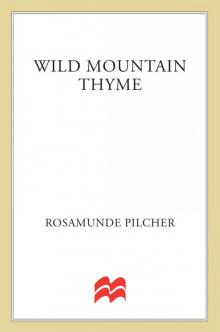 Wild Mountain Thyme
Wild Mountain Thyme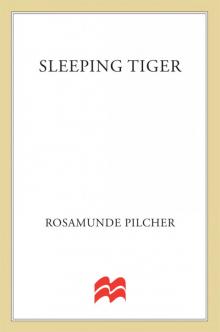 Sleeping Tiger
Sleeping Tiger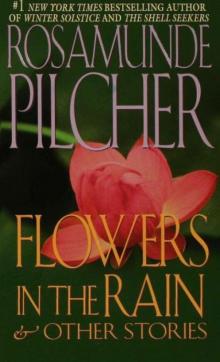 Flowers in the Rain & Other Stories
Flowers in the Rain & Other Stories September
September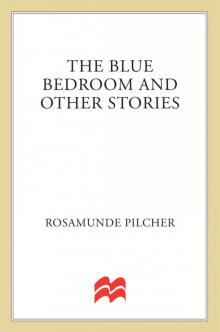 The Blue Bedroom: & Other Stories
The Blue Bedroom: & Other Stories The Carousel
The Carousel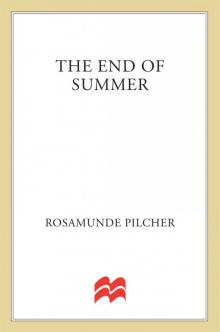 The End of Summer
The End of Summer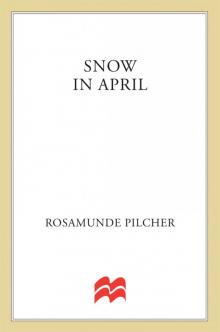 Snow in April
Snow in April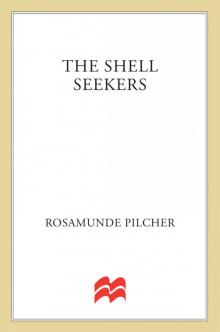 The Shell Seekers
The Shell Seekers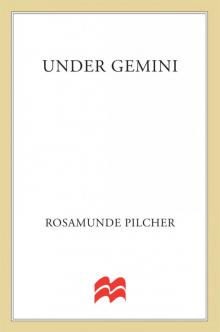 Under Gemini
Under Gemini The Empty House
The Empty House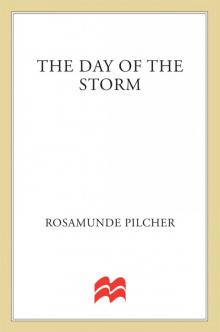 The Day of the Storm
The Day of the Storm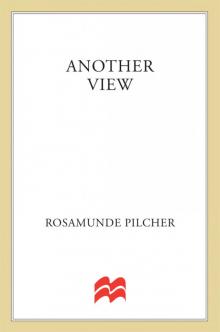 Another View
Another View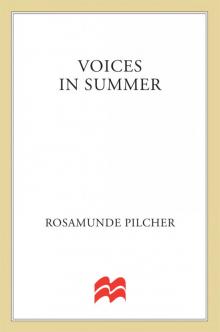 Voices in the Summer
Voices in the Summer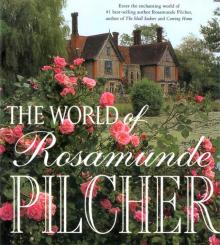 The World of Rosamunde Pilcher
The World of Rosamunde Pilcher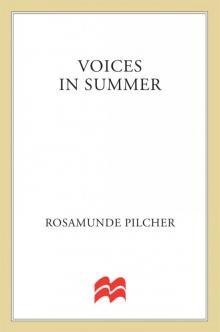 Voices In Summer
Voices In Summer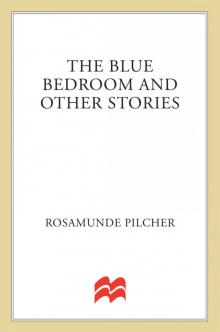 Blue Bedroom and Other Stories
Blue Bedroom and Other Stories